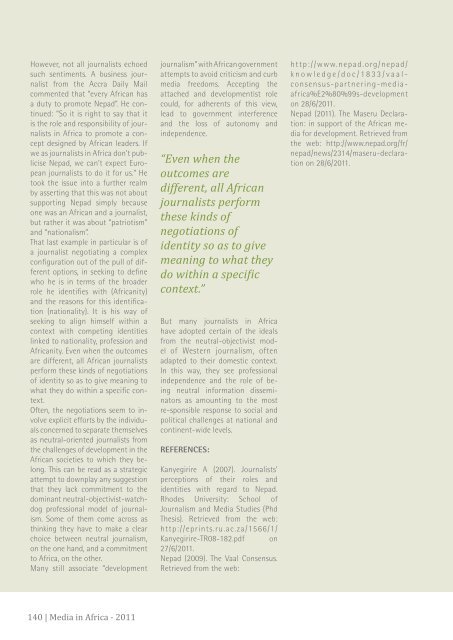Twenty years after the Windhoek Declaration on press freedom
Twenty years after the Windhoek Declaration on press freedom
Twenty years after the Windhoek Declaration on press freedom
You also want an ePaper? Increase the reach of your titles
YUMPU automatically turns print PDFs into web optimized ePapers that Google loves.
However, not all journalists echoed<br />
such sentiments. A business journalist<br />
from <str<strong>on</strong>g>the</str<strong>on</strong>g> Accra Daily Mail<br />
commented that “every African has<br />
a duty to promote Nepad”. He c<strong>on</strong>tinued:<br />
“So it is right to say that it<br />
is <str<strong>on</strong>g>the</str<strong>on</strong>g> role and resp<strong>on</strong>sibility of journalists<br />
in Africa to promote a c<strong>on</strong>cept<br />
designed by African leaders. If<br />
we as journalists in Africa d<strong>on</strong>’t publicise<br />
Nepad, we can’t expect European<br />
journalists to do it for us.” He<br />
took <str<strong>on</strong>g>the</str<strong>on</strong>g> issue into a fur<str<strong>on</strong>g>the</str<strong>on</strong>g>r realm<br />
by asserting that this was not about<br />
supporting Nepad simply because<br />
<strong>on</strong>e was an African and a journalist,<br />
but ra<str<strong>on</strong>g>the</str<strong>on</strong>g>r it was about “patriotism”<br />
and “nati<strong>on</strong>alism”.<br />
That last example in particular is of<br />
a journalist negotiating a complex<br />
c<strong>on</strong>figurati<strong>on</strong> out of <str<strong>on</strong>g>the</str<strong>on</strong>g> pull of different<br />
opti<strong>on</strong>s, in seeking to define<br />
who he is in terms of <str<strong>on</strong>g>the</str<strong>on</strong>g> broader<br />
role he identifies with (Africanity)<br />
and <str<strong>on</strong>g>the</str<strong>on</strong>g> reas<strong>on</strong>s for this identificati<strong>on</strong><br />
(nati<strong>on</strong>ality). It is his way of<br />
seeking to align himself within a<br />
c<strong>on</strong>text with competing identities<br />
linked to nati<strong>on</strong>ality, professi<strong>on</strong> and<br />
Africanity. Even when <str<strong>on</strong>g>the</str<strong>on</strong>g> outcomes<br />
are different, all African journalists<br />
perform <str<strong>on</strong>g>the</str<strong>on</strong>g>se kinds of negotiati<strong>on</strong>s<br />
of identity so as to give meaning to<br />
what <str<strong>on</strong>g>the</str<strong>on</strong>g>y do within a specific c<strong>on</strong>text.<br />
Often, <str<strong>on</strong>g>the</str<strong>on</strong>g> negotiati<strong>on</strong>s seem to involve<br />
explicit efforts by <str<strong>on</strong>g>the</str<strong>on</strong>g> individuals<br />
c<strong>on</strong>cerned to separate <str<strong>on</strong>g>the</str<strong>on</strong>g>mselves<br />
as neutral-oriented journalists from<br />
<str<strong>on</strong>g>the</str<strong>on</strong>g> challenges of development in <str<strong>on</strong>g>the</str<strong>on</strong>g><br />
African societies to which <str<strong>on</strong>g>the</str<strong>on</strong>g>y bel<strong>on</strong>g.<br />
This can be read as a strategic<br />
attempt to downplay any suggesti<strong>on</strong><br />
that <str<strong>on</strong>g>the</str<strong>on</strong>g>y lack commitment to <str<strong>on</strong>g>the</str<strong>on</strong>g><br />
dominant neutral-objectivist-watchdog<br />
professi<strong>on</strong>al model of journalism.<br />
Some of <str<strong>on</strong>g>the</str<strong>on</strong>g>m come across as<br />
thinking <str<strong>on</strong>g>the</str<strong>on</strong>g>y have to make a clear<br />
choice between neutral journalism,<br />
<strong>on</strong> <str<strong>on</strong>g>the</str<strong>on</strong>g> <strong>on</strong>e hand, and a commitment<br />
to Africa, <strong>on</strong> <str<strong>on</strong>g>the</str<strong>on</strong>g> o<str<strong>on</strong>g>the</str<strong>on</strong>g>r.<br />
Many still associate “development<br />
140 | Media in Africa - 2011<br />
journalism” with African government<br />
attempts to avoid criticism and curb<br />
media <strong>freedom</strong>s. Accepting <str<strong>on</strong>g>the</str<strong>on</strong>g><br />
attached and developmentist role<br />
could, for adherents of this view,<br />
lead to government interference<br />
and <str<strong>on</strong>g>the</str<strong>on</strong>g> loss of aut<strong>on</strong>omy and<br />
independence.<br />
“Even when <str<strong>on</strong>g>the</str<strong>on</strong>g><br />
outcomes are<br />
different, all African<br />
journalists perform<br />
<str<strong>on</strong>g>the</str<strong>on</strong>g>se kinds of<br />
negotiati<strong>on</strong>s of<br />
identity so as to give<br />
meaning to what <str<strong>on</strong>g>the</str<strong>on</strong>g>y<br />
do within a specific<br />
c<strong>on</strong>text.”<br />
But many journalists in Africa<br />
have adopted certain of <str<strong>on</strong>g>the</str<strong>on</strong>g> ideals<br />
from <str<strong>on</strong>g>the</str<strong>on</strong>g> neutral-objectivist model<br />
of Western journalism, often<br />
adapted to <str<strong>on</strong>g>the</str<strong>on</strong>g>ir domestic c<strong>on</strong>text.<br />
In this way, <str<strong>on</strong>g>the</str<strong>on</strong>g>y see professi<strong>on</strong>al<br />
independence and <str<strong>on</strong>g>the</str<strong>on</strong>g> role of being<br />
neutral informati<strong>on</strong> disseminators<br />
as amounting to <str<strong>on</strong>g>the</str<strong>on</strong>g> most<br />
re-sp<strong>on</strong>sible resp<strong>on</strong>se to social and<br />
political challenges at nati<strong>on</strong>al and<br />
c<strong>on</strong>tinent-wide levels.<br />
REFERENCES:<br />
Kanyegirire A (2007). Journalists’<br />
percepti<strong>on</strong>s of <str<strong>on</strong>g>the</str<strong>on</strong>g>ir roles and<br />
identities with regard to Nepad.<br />
Rhodes University: School of<br />
Journalism and Media Studies (Phd<br />
Thesis). Retrieved from <str<strong>on</strong>g>the</str<strong>on</strong>g> web:<br />
http://eprints.ru.ac.za/1566/1/<br />
Kanyegirire-TR08-182.pdf <strong>on</strong><br />
27/6/2011.<br />
Nepad (2009). The Vaal C<strong>on</strong>sensus.<br />
Retrieved from <str<strong>on</strong>g>the</str<strong>on</strong>g> web:<br />
http://www.nepad.org/nepad/<br />
k n o w l e d g e / d o c / 1 8 3 3 / v a a l -<br />
c<strong>on</strong>sensus-partnering-mediaafrica%E2%80%99s-development<br />
<strong>on</strong> 28/6/2011.<br />
Nepad (2011). The Maseru <str<strong>on</strong>g>Declarati<strong>on</strong></str<strong>on</strong>g>:<br />
in support of <str<strong>on</strong>g>the</str<strong>on</strong>g> African media<br />
for development. Retrieved from<br />
<str<strong>on</strong>g>the</str<strong>on</strong>g> web: http://www.nepad.org/fr/<br />
nepad/news/2314/maseru-declarati<strong>on</strong><br />
<strong>on</strong> 28/6/2011.












